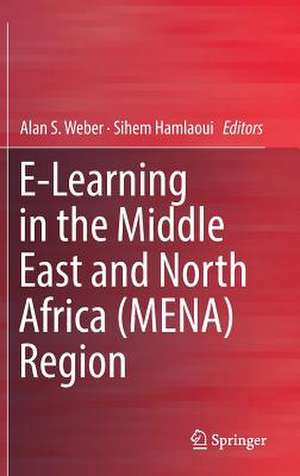E-Learning in the Middle East and North Africa (MENA) Region
Editat de Alan S. Weber, Sihem Hamlaouien Limba Engleză Hardback – 9 mar 2018
This unique volume is the first comprehensive effort to describe the history, development, and current state of e-learning in each of the 20 MENA countries from Algeria to Yemen. Each entry is expertly written by a specialist who is acutely familiar with the state of e-learning in their respective country, and concludes with a bibliography of key reports, peer-reviewed books and articles, and web resources.
E-Learning in the Middle East andNorth Africa (MENA) proves itself as a vital compendium for a wide readership that includes academics and students, transnational program directors, international education experts, MENA government departments, commercial vendors and investors, and ICT development and regulatory agencies involved in e-learning in the Middle East.
| Toate formatele și edițiile | Preț | Express |
|---|---|---|
| Paperback (1) | 651.51 lei 6-8 săpt. | |
| Springer International Publishing – 2 feb 2019 | 651.51 lei 6-8 săpt. | |
| Hardback (1) | 657.90 lei 6-8 săpt. | |
| Springer International Publishing – 9 mar 2018 | 657.90 lei 6-8 săpt. |
Preț: 657.90 lei
Preț vechi: 774.00 lei
-15% Nou
Puncte Express: 987
Preț estimativ în valută:
125.93€ • 136.83$ • 105.85£
125.93€ • 136.83$ • 105.85£
Carte tipărită la comandă
Livrare economică 21 aprilie-05 mai
Preluare comenzi: 021 569.72.76
Specificații
ISBN-13: 9783319689982
ISBN-10: 3319689983
Pagini: 534
Ilustrații: XII, 507 p. 72 illus., 47 illus. in color.
Dimensiuni: 155 x 235 mm
Greutate: 0.9 kg
Ediția:1st ed. 2018
Editura: Springer International Publishing
Colecția Springer
Locul publicării:Cham, Switzerland
ISBN-10: 3319689983
Pagini: 534
Ilustrații: XII, 507 p. 72 illus., 47 illus. in color.
Dimensiuni: 155 x 235 mm
Greutate: 0.9 kg
Ediția:1st ed. 2018
Editura: Springer International Publishing
Colecția Springer
Locul publicării:Cham, Switzerland
Cuprins
Chapter 1. Algeria.- Chapter 2.Bahrain.- Chapter 3.Djibouti.- Chapter 4.Egypt.- Chapter 5.Iran.- Chapter 6.Iraq.- Chapter 7.Israel.- Chapter 8.Jordan.- Chapter 9.Kuwait.- Chapter 10.Lebanon.- Chapter 11.Libya.- Chapter 12.Morocco.- Chapter 13.Oman.- Chapter 14.Palestine (West Bank / Gaza Strip).- Chapter 15.Qatar.- Chapter 16.Saudi Arabia.- Chapter 17. Syria.- Chapter 18.Tunisia.- Chapter 19.United Arab Emirates.- Chapter 20.Yemen.
Notă biografică
Alan S. Weber, PhD, has taught humanities, philosophy, and medical ethics for the past 10 years at Weill Cornell Medicine - Qatar, a satellite campus of Cornell University in Education City, Doha, Qatar. He has held appointments at The Pennsylvania State University, Elmira College, and Cornell University. His course “Electronic Shakespeare” in 1996 was one of the first entirely online courses in New York State.
Sihem Hamlaoui is an Arabic, English and French speaking graduate student who completed her M.A. in Linguistics and Web Technologies from Philipps-Universität Marburg in Marburg, Germany in 2013. She is currently completing her PhD on e-learning in the MENA region. She additionally holds a B.A. in English Linguistics from the Institut Supérieur des Langues Vivantes Tunis, Tunisia. She also taught English at the Elmessadi Nabeul Secondary School in Tunisia.
Sihem Hamlaoui is an Arabic, English and French speaking graduate student who completed her M.A. in Linguistics and Web Technologies from Philipps-Universität Marburg in Marburg, Germany in 2013. She is currently completing her PhD on e-learning in the MENA region. She additionally holds a B.A. in English Linguistics from the Institut Supérieur des Langues Vivantes Tunis, Tunisia. She also taught English at the Elmessadi Nabeul Secondary School in Tunisia.
Textul de pe ultima copertă
In the last decade, due to factors of ICT infrastructural and broadband maturation, rising levels of educational attainment and computer literacy, and diversification strategies, e-learning has exploded in the Middle East and North Africa (MENA) region. However, significant barriers remain in the region’s e-learning development: lack of research on outcomes and effectiveness, paucity of Arabic language learning objects, monopolies and high cost of telecommunications, cultural taboos, accreditation, censorship, and teacher training.
This unique volume is the first comprehensive effort to describe the history, development, and current state of e-learning in each of the 20 MENA countries from Algeria to Yemen. Each entry is expertly written by a specialist who is acutely familiar with the state of e-learning in their respective country, and concludes with a bibliography of key reports, peer-reviewed books and articles, and web resources.
E-Learning in the Middle East and North Africa (MENA) proves itself as a vital compendium for a wide readership that includes academics and students, transnational program directors, international education experts, MENA government departments, commercial vendors and investors, and ICT development and regulatory agencies involved in e-learning in the Middle East.
This unique volume is the first comprehensive effort to describe the history, development, and current state of e-learning in each of the 20 MENA countries from Algeria to Yemen. Each entry is expertly written by a specialist who is acutely familiar with the state of e-learning in their respective country, and concludes with a bibliography of key reports, peer-reviewed books and articles, and web resources.
E-Learning in the Middle East and North Africa (MENA) proves itself as a vital compendium for a wide readership that includes academics and students, transnational program directors, international education experts, MENA government departments, commercial vendors and investors, and ICT development and regulatory agencies involved in e-learning in the Middle East.
Caracteristici
The only comprehensive resource on e-learning in the Middle East and North Africa Provides regional guidelines to initiating e-learning programs Written by experts in each regional area
